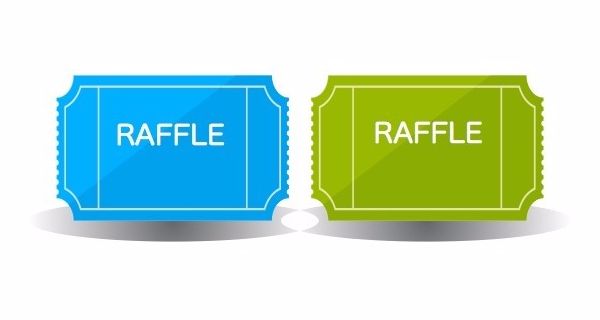Do you want to take your auction events to new heights? Raffles are a great add-on fundraising tool for all event types, and easy to introduce to your event!. For those who are newer to event planning, a raffle is a means of raising money by selling tickets, a ticket is subsequently drawn at random, and the person that has the winning ticket wins the raffle prize. Raffles are a great way to involve your event attendees throughout your fundraiser and help raise more funds for your cause.
As you plan Raffles for your future events make sure to keep the following in mind:
- Choose Exciting Items
- Auctria Raffle Features
- Types of Raffles
- Know the Regulations
You have the option to sell tickets online, in-person, or a combination of both, Auctria has the tools you need to run a successful Raffle during your event.
1. Choose Exciting Items
When planning out the Raffle for your event, you will have to pick out a star-stopping raffle prize. While some organizations will pick a cash prize for their raffle, many organizations will choose to raffle off an actual auction item. We’ll cover many of these exciting set ups further on in the article, but one of the most important planning steps is sourcing your raffle prize items and setting up your raffle.
Sponsorships and donations are a great way to source raffle prize items without any initial investment from your organization! By finding a sponsor or a donor, you’ll be able to raffle off a prize that you received in order to raise more funds for your cause. Many groups choose exciting items such as exclusive experiences, celebrity meet and greets, VIP offerings, and more! Make sure to leverage your networks and see what they have to offer for your upcoming event.
If you are having a hard time finding items to raffle off, Auctria offers a list of Auction Items and No Risk Consignment Items from partnering organizations here.
How to determine which item to raffle versus offer at auction?
Raffles can be used to boost the income for a popular auction item that may ‘sell’ for only face value. For example: the local amusement park has donated 4 tickets for a value of $200. In the past auctions the sale maxed out at the $200 face value. Using a raffle scenario tickets can be sold at smaller increments but in an infinite quantity. At the end of the event the $200 amusement park tickets can net much more than $200 simply by offering it as a raffle prize and selling tickets at your event.
2. Auctria Raffle Features in the Dashboard
Auctria offers a specific “Raffles Dashboard” for event admins to set up raffle tickets and raffle prize items for their auctions and fundraisers. Using the raffles dashboard allows you to keep your raffle(s) organized and award the raffle prizes in multiple ways
DASH IMAGE HERE
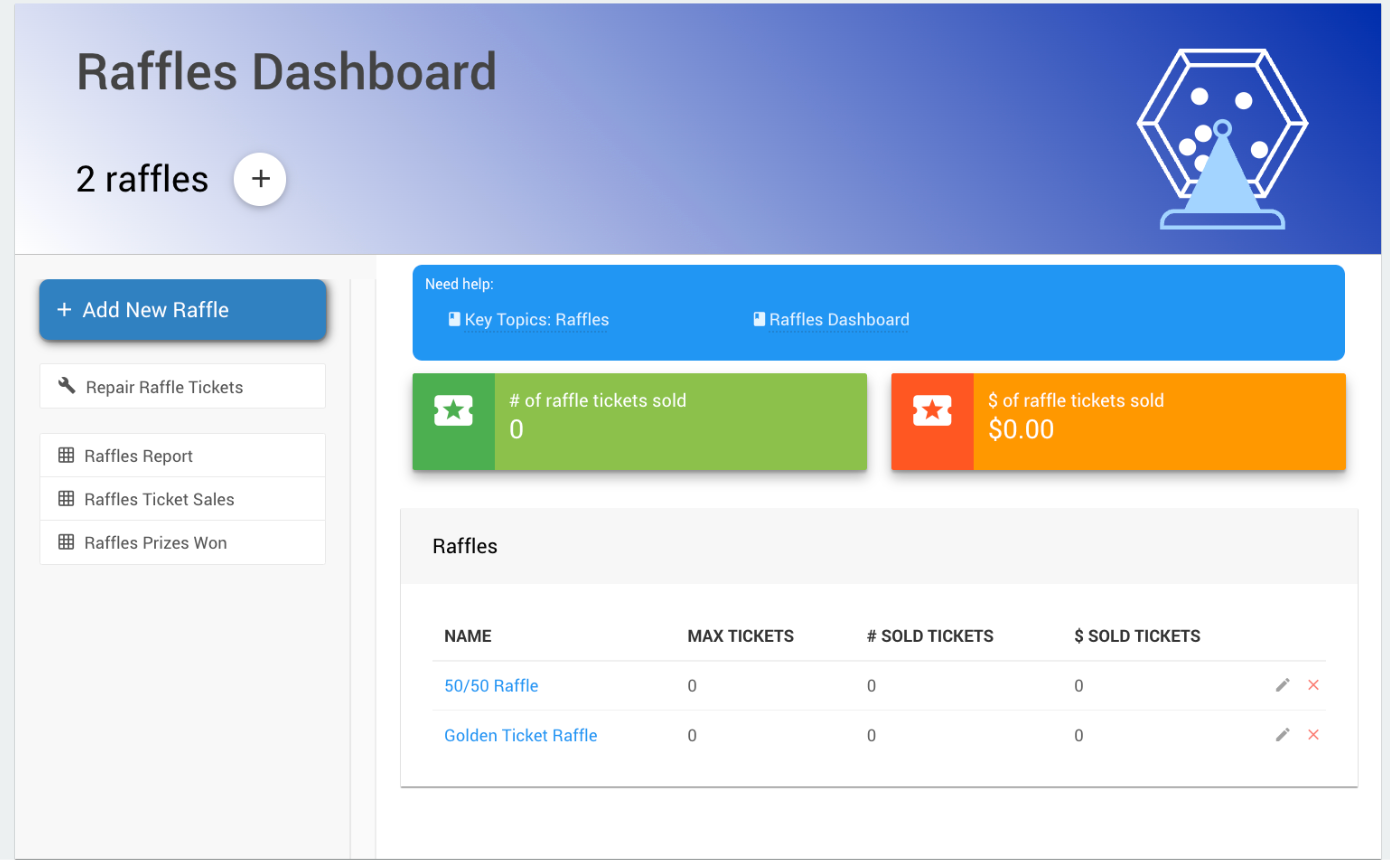
The first way to award the raffle prize through Auctra is to use the automatic “Award Prize” button directly on the raffle prize item, which makes the award process as simple as ever!
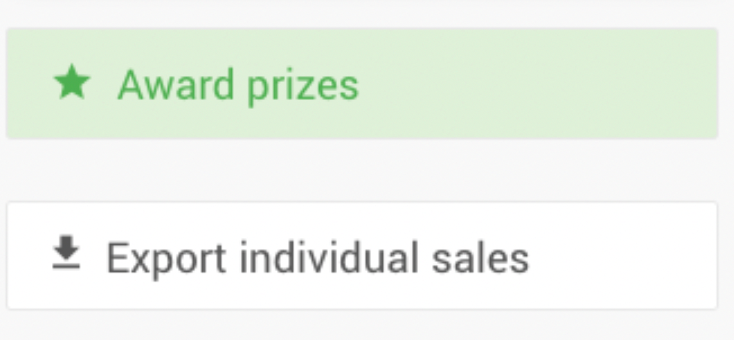
If you plan to choose the raffle prize winner outside of the Auctria system, you can export the “Export Individual Sales” report from the Raffle Dashboard page in Auctria. Once you have all of these sales available to you in the exported form, you can use these sales to “pick” a winner. Many groups will then use something like an online Wheel Picker, or another randomizer like horse racing to pick the final winner for their event.
For more event inspiration, make sure to check out Auctria’s Event Directory!
3. Types of Raffles
Traditional Raffle
With a traditional raffle, you can sell tickets and choose a winner randomly at a given time to give the ticket holder the prize. Whether you choose to sell your raffle tickets online or in-person, a traditional raffle is a great way to engage your audience and build excitement for your event while raising extra money for your cause.
50/50 Cash Raffle
With a 50/50 Cash Raffle, you will sell tickets and at a given time choose one randomly. The winner will win 50% of the cash proceeds and the remaining 50% benefits the charity. One of the best parts about a 50/50 Cash Raffle is that there is no upfront investment for this type of raffle - you start selling the tickets and simply share the funds raised with the raffle winner.
In Auctria, you can both sell raffle tickets.
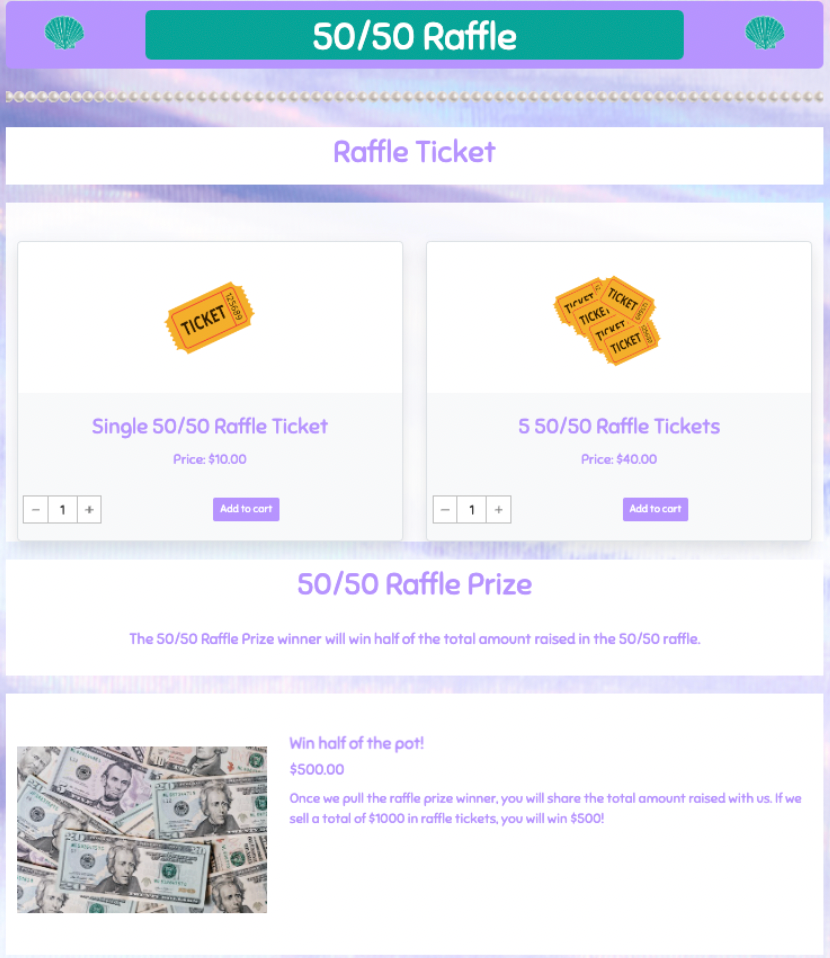
Hot tip- use the “Value” on the Raffle Prize to share how much the 50/50 prize is up to by configuring an income tracker or thermomter to show JUST the 50/50 raffle sales.
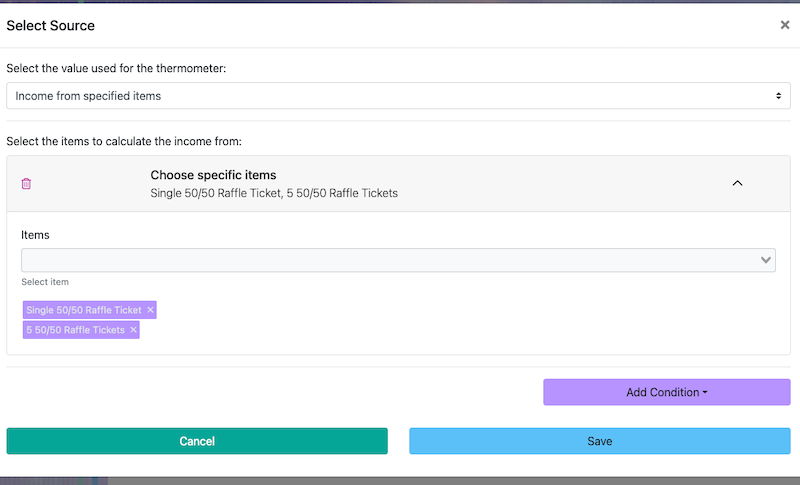
Jumbo Raffle
The “jumbo” in the “Jumbo Raffle” is referring to the size of the prize in terms of its value. In this case, there is a quantity set so the raffle tickets are not oversold.
Here are two examples:
- Win a $2000 Air B&B gift certificate, selling tickets at $50 with a max quantity of 100 tickets sold. Total revenue = $5000, minus the price of the gift card will net you a total of $3000
- Win $500 Amazon gift card, selling $25 tickets with a maximum quantity of 100 tickets sold. Total revenue = $2500, minus the price of the gift card will net you a total of $2000
Bucket/Pick-a-Prize Raffle
A “Bucket Raffle” is exactly what it sounds like - it differentiates itself by using a bucket, hat, box, or even “Tricky Tray” where participants will put their raffle ticket in the container. This type of raffle is also called a “Pick-a-Prize” raffle.
Participants purchase or are given multiple tickets and they put it in the bucket, or “prize” they would most like to win. Participants may increase their chance of winning by bidding more tickets on one specific item. This type of raffle works really well when you have multiple prizes to give out, and you’re hosting an event where the prizes can be spread out and displayed. Guests should have the opportunity to look at the variety of items offered, much like they would for an in-person auction. Since tickets in the bucket only come from guests that want to win that specific item there is no issue of a winner receiving an item they do not want!
Golden Ticket Raffle
One simple way to supercharge your fundraising is to raffle off a single, high-value item, like a vacation as a “Golden Ticket” raffle. In this raffle strategy, you will sell high-priced raffle tickets to your bidders for their chance at your showstopping “Golden Ticket” prize. Make sure that you pick an item that is easy to promote like a VIP experience, or a popular vacation. Many groups will use their “Golden Ticket” raffle as an opportunity for guests to choose a “Live Auction” item as their prize before the Live Auction actually starts.
In many “Golden Ticket” raffle tickets are sold as a single, “Golden Ticket,” and typically priced around $100. In Auctria, you can display both your raffle ticket and raffle prize on the same page to drive engagement:

Registration Raffle
If you’re looking to increase registration for your online or in-person event, a registration raffle is the perfect way to engage more bidders. With more bidders engaged in your event, you’ll see an increase in bid activity. The key idea behind this raffle is to boost both activity and attendance for your event by providing a reward to registration.
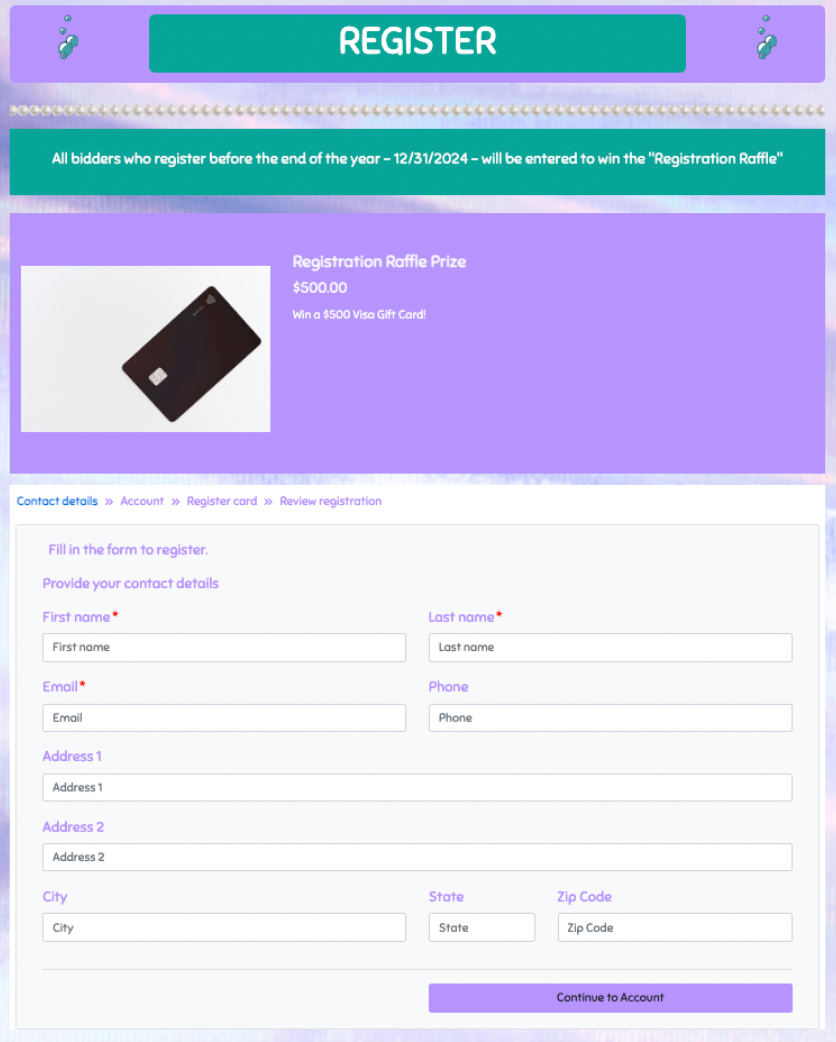
A great way to do this is by providing anyone who registers by a specific date will be entered into a raffle - you can provide specific guidelines or rules, like only applicable for mobile bidding, or for folks who register via text, for example.
The best part of this type of raffle is you can use Auctria to tie raffle tickets to “Early Bird Tickets” and other set-up strategies, just ask an Auctria Specialist how!
Mystery Box
A mystery phenomenon is always intriguing for attendees. We have seen many events market mysteries ranging from hidden item boxes or guessing contests. After the raffle winner is chosen the mystery can be revealed to all at the event. If you share the estimated value of the prize it can make the raffle more enticing to donors.
4. Know the Regulations
Just a friendly reminder - raffles are considered a “game of chance” and may be regulated in your jurisdiction. Before launching your raffle, make sure that you consult the proper authorities knowledgeable in this area.
Bingos, raffles, and other games of chance can be a fun way for charities to connect with the community while also raising funds. Hosting a gaming event is an exciting opportunity for organizations, but sometimes the state and local government prerequisites for holding such an event get lost in the excitement.
Most states allow charitable organizations to conduct a variety of gaming events as long as the organization holds the proper license. For more details on Licenses and Permits, Hosting an Event, Maintaining a License and Risks of Noncompliance visit Harbor Compliance's Guide to Charitable Gaming Compliance. Included in the guide is a link for state specific information on how to obtain a charitable gaming license. For Canada, here is a complete run-down on the specific raffle regulations in each province.
Redefining Generosity
The winning ticket to compassionate giving is alive in charity raffles. Whether you are hosting an online or an in-person event, adding a raffle is a great strategy to drive extra funds to your cause. Using Auctria’s software, you can create Raffle Tickets and Raffle Prizes and use the dashboard to display and sell your tickets, award your prizes, or download your sales and use that information in a creative way.
